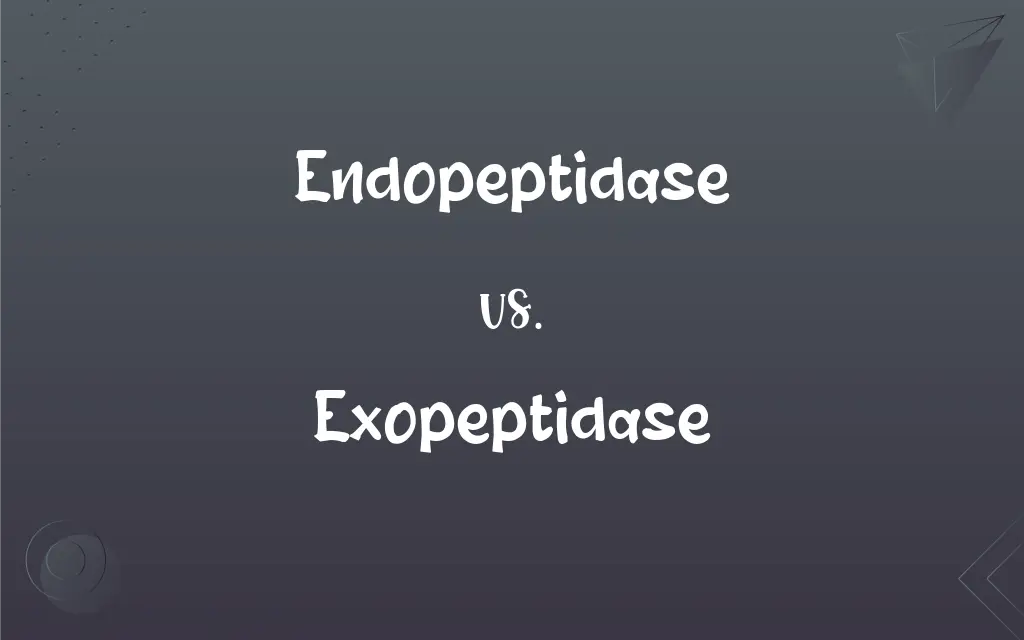Endopeptidase vs. Exopeptidase: What's the Difference?
Edited by Harlon Moss || By Janet White || Published on January 23, 2024
Endopeptidases break peptide bonds within a protein; exopeptidases cleave terminal amino acids from the ends.

Key Differences
Endopeptidases and exopeptidases are both enzymes that break down proteins, but they act differently. Endopeptidases cut peptide bonds within the protein chain, breaking the protein into smaller fragments. Exopeptidases, on the other hand, remove amino acids from the ends of the protein chain, either the N-terminus or the C-terminus.
Endopeptidases play a crucial role in protein metabolism and digestion by breaking down complex protein structures. In contrast, exopeptidases further process these fragments into individual amino acids or short peptides, facilitating their absorption and use in the body.
Endopeptidases include enzymes like trypsin and pepsin, which are key in digestive processes. Exopeptidases include carboxypeptidases and aminopeptidases, which help in the final stages of protein digestion.
In terms of specificity, endopeptidases often target specific peptide bonds within a protein, based on the amino acid sequence. Exopeptidases are more concerned with the terminal amino acids, with little regard for the internal sequence of the protein.
Both endopeptidases and exopeptidases are essential for various physiological processes, including not only digestion but also cellular functions such as protein turnover and regulation.
ADVERTISEMENT
Comparison Chart
Action Site
Within protein chain
Terminal ends of protein chain
Function
Breaks proteins into smaller fragments
Removes terminal amino acids
Example Enzymes
Trypsin, Pepsin
Carboxypeptidases, Aminopeptidases
Role in Digestion
Primary breakdown of proteins
Final stages of protein digestion
Specificity
Specific peptide bonds
Terminal amino acids
ADVERTISEMENT
Endopeptidase and Exopeptidase Definitions
Endopeptidase
An enzyme that cleaves peptide bonds within proteins.
Endopeptidases like trypsin are essential in protein digestion.
Exopeptidase
An enzyme essential for amino acid release.
Exopeptidases help in liberating individual amino acids from peptides.
Endopeptidase
A key enzyme in metabolic processes.
Endopeptidases play a vital role in metabolizing proteins.
Exopeptidase
A protease acting at the ends of peptide chains.
Exopeptidases trim the N-terminus or C-terminus of peptides.
Endopeptidase
A type of protease for complex protein breakdown.
Endopeptidases initiate the breakdown of dietary proteins.
Exopeptidase
An enzyme that removes terminal amino acids from proteins.
Exopeptidases are crucial in the final steps of protein digestion.
Endopeptidase
A protein-breaking enzyme with internal action.
Endopeptidases target specific sites within a protein molecule.
Exopeptidase
A key player in protein absorption.
Exopeptidases facilitate the absorption of amino acids in the intestine.
Endopeptidase
An enzyme aiding in cellular protein turnover.
Endopeptidases contribute to the regulation of protein levels in cells.
Exopeptidase
A protease that aids in peptide processing.
Exopeptidases process peptide fragments into smaller units.
Endopeptidase
Any of a large group of enzymes that catalyze the hydrolysis of peptide bonds in the interior of a polypeptide chain or protein molecule.
Exopeptidase
Any of a group of enzymes that catalyze the hydrolysis of single amino acids from the end of a polypeptide chain.
Endopeptidase
(enzyme) Any of a group of enzymes, such as trypsin, chymotrypsin, pepsin and elastase, which catalyze the splitting of polypeptide chains away from the ends
Exopeptidase
(enzyme) Any of a group of enzymes which catalyze the removal of a single amino acid from the end of a polypeptide chain
FAQs
Where do exopeptidases act?
At the N-terminal or C-terminal ends of proteins.
Where do endopeptidases act?
Within the internal structure of proteins.
What is an exopeptidase?
An enzyme that cleaves amino acids from the ends of a protein.
Are endopeptidases specific?
Yes, they often target specific peptide bonds.
Are endopeptidases found in all organisms?
They are present in most organisms, playing a vital role in protein metabolism.
What is an endopeptidase?
An enzyme that breaks peptide bonds within a protein molecule.
Are exopeptidases specific?
They are specific to terminal amino acids.
Do exopeptidases have medical applications?
Yes, in studying amino acid metabolism disorders.
What is the role of endopeptidases in digestion?
They initiate the breakdown of dietary proteins.
Can endopeptidases be inhibited?
Yes, using specific inhibitors for therapeutic purposes.
How are exopeptidases regulated?
Regulation occurs through cellular control and substrate availability.
What are examples of exopeptidases?
Carboxypeptidases and aminopeptidases are typical examples.
Can exopeptidases be inhibited?
Inhibition is possible and used in certain medical treatments.
Are exopeptidases found in all organisms?
They are widespread in organisms for protein processing.
What are examples of endopeptidases?
Trypsin and pepsin are common examples.
What is the role of exopeptidases in digestion?
They finalize protein digestion by releasing amino acids.
Do endopeptidases have medical applications?
Yes, in understanding diseases related to protein misfolding.
How are endopeptidases regulated?
Their activity is controlled by various cellular mechanisms.
Do exopeptidases affect cellular functions?
They are essential in amino acid recycling and protein degradation.
Do endopeptidases affect cellular functions?
Yes, they are involved in protein turnover and signaling.
About Author
Written by
Janet WhiteJanet White has been an esteemed writer and blogger for Difference Wiki. Holding a Master's degree in Science and Medical Journalism from the prestigious Boston University, she has consistently demonstrated her expertise and passion for her field. When she's not immersed in her work, Janet relishes her time exercising, delving into a good book, and cherishing moments with friends and family.
Edited by
Harlon MossHarlon is a seasoned quality moderator and accomplished content writer for Difference Wiki. An alumnus of the prestigious University of California, he earned his degree in Computer Science. Leveraging his academic background, Harlon brings a meticulous and informed perspective to his work, ensuring content accuracy and excellence.






































































